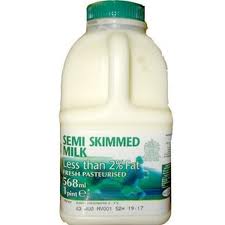Skimmed milk may be making us fat since we are more likely to consume more of it, according to a new study.
Most of us now use skimmed or semi-skimmed milk instead of whole milk, which in fact contains more nutrients and is more filling.
By reducing the fat, the skimmed milk is lower in calories, but the authors of a new study, David Ludwig, of Boston’s Children Hospital, and Dr. Walter Willett, of the Harvard School of Public Health, have concluded that lower calorie drinks do not necessarily equate to a lower calorie intake.

They also claim that there is very little evidence that skimmed milk promotes weight loss and since reduced fat foods might not be as filling, they could lead consumers to compensate by eating and drinking more.
“Our original hypothesis was that children who drank high fat milk, either whole milk or two per cent, would be heavier because they were consuming more saturated fat calories,” said author of the study Dr. Mark Daniel DeBoer, an associate professor of pediatric endocrinology at the University of Virgina School of Medicine.
Looking at children they discovered that those who drank skimmed milk were likely to be fatter.
“We were really surprised when we looked at the data and it was very clear that within every ethnicity and every socioeconomic strata, that it was actually the opposite, that children who drank skim milk and one-percent were heavier than those who drank two-percent and whole.”
In any event full-fat milk only contains three to four per cent fat. While many milk drinks containing skimmed may have added sugar and fatty substances such as chocolate added.
“Somehow this low-fat milk has become so entrenched in the nutritional psyche, it persists despite the absence of evidence,’ said Mr Ludwig.
“To the contrary, the evidence that now exists suggests an adverse effect of reduced-fat milk.”
Full-fat dairy is a vital source of the fat-soluble vitamins A, D, E and K as well as calcium and phosphorus, the minerals that work with vitamin D for build strong bones.
But the term ‘fat-soluble’ means that these vitamins need to be delivered in or with fat for the nutrients to be available to the body. Taking the fat out makes it difficult or even impossible to absorb them.
